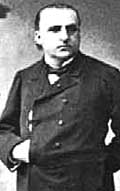Sigmund Freud And... |
Jean-Martin Charcot
 J.-M. Charcot (1825-1893) had an outstanding influence on the young Freud, to the extent that he named his first son after him. Freud's stay with
Charcot for four months between 1885-1886 left him an impression which took some time to fade away. Strongly interested in hypnosis at the time, Freud had addressed the great master with an aim of improving his own technique.
J.-M. Charcot (1825-1893) had an outstanding influence on the young Freud, to the extent that he named his first son after him. Freud's stay with
Charcot for four months between 1885-1886 left him an impression which took some time to fade away. Strongly interested in hypnosis at the time, Freud had addressed the great master with an aim of improving his own technique.
Of Parisian origin, Charcot was the prototype of the great master of medicine of the time, the topic of all talks and carrying out a fashionable life.
It is in Salpetriere, where he settled in 1862, that his glorious career truly began, leaving strong marks on neurology and modern psychiatry. Accumulating prestigious titles, Charcot
became a universally recognized celebrity, called upon everywhere in the world at the bedside of aristocrats and moneyed people. Even if Charcot designed a work of authority in several fields
of medicine, it is by his work on hysteria that he is especially recognized today. Applying to hysteria the method of observation and methodical description borrowed from neurology, Charcot's aim was to lay down the universal rules
of the great hysterical attack. By means of hypnosis, Charcot induced a hysterical attack in his patients meeting his standards. The trouble was that his patients, just as his
collaborators, were more inclined to confirm the Master's insights than undertake true scientific search. Towards the end of his life, Charcot himself questioned his
own work on hysteria, which did not prevent a long and lively controversy with the school known as of Nancy, under the leadership of Liebeault and All history preserved was Freud's being impressed by a
private conversation with Charcot, revealing him that there is always an intimate secret underlying hysteria.
--
Copyright René DesGroseillers
Read also:
|
|
Home | Resources | Forum | Newsletter | Contact Copyright 1999-2024, AROPA. All rights reserved.
![]()